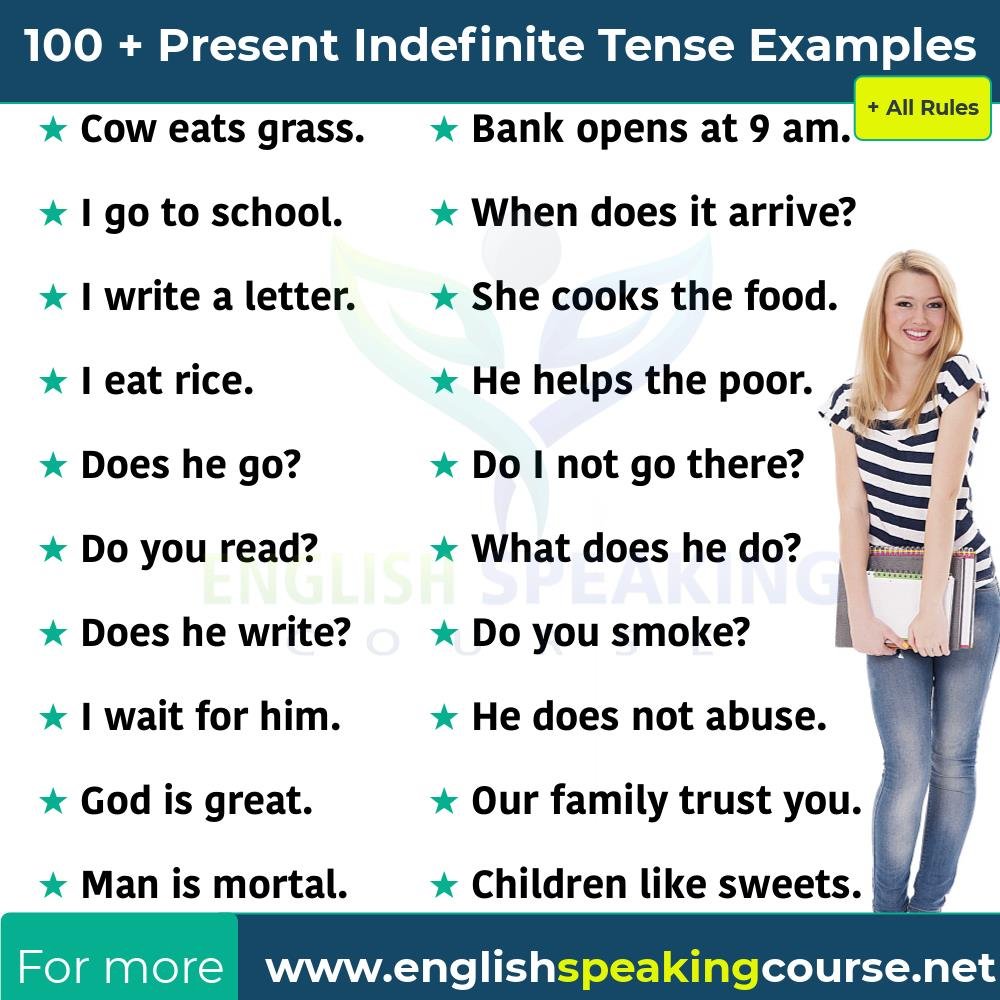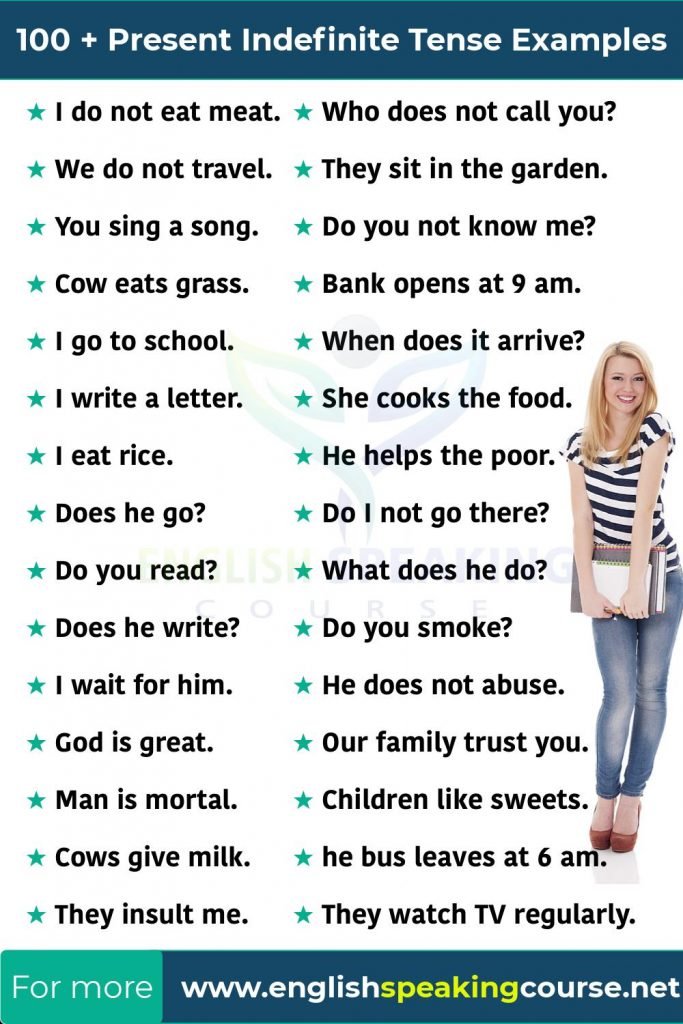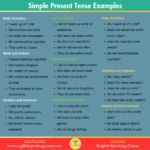
Table of Contents
TogglePresent Indefinite Tense + All Rules
Present Indefinite Tense: This post is showing Present Indefinite Tense information but also try to cover the following subject:
-What is Tense?
-Present indefinite tense structure
-Present indefinite tense all rules
Today we will learn Tense. Because it is very important to know Tense when learning English. Many people are afraid of Tense because they think Tense is very difficult. There is no reason to be afraid of Tense, Tense can be learned very easily. I will try to teach you Tense through small examples. So that you can easily understand or learn Tense. You have to learn Tense to speak English. And if you know Tense, you can easily speak in English.
What is Tense?
Tense is a verb form that shows the time of an action, event or state.
We divide tense into three parts – Present, Past and Future.
Types of Tense:
Tense is divided into three parts according to English grammar –
– Present Tense
– Past Tense
– Future Tense
Each tense is again divided into four parts.
– Indefinite Tense
– Continuous Tense
– Perfect Tense
– Perfect Continuous Tense
Then you have learned what Tense is and its types.
Let’s discuss the present tense and its types.
Present Tense
If a work is organized at present, it is called Present Tense.
Or, the work that we do at the present time is called Present Tense.
According to English grammar, the present tense is divided into four parts.
1. Present Indefinite Tense
2. Present Continuous Tense
3. Present Perfect Tense
4. Present Perfect Continuous Tense
Person:
Before learning Tense, you need to know about Person.
Such as –
First Person – I, We
Second Person – You, Your
Third Person – He, she, it and all the name
Present Indefinite Tense
It is used to express an action in the present. Also express true events, the near future, habit, nature etc. It is used to express an action in present time which is usually done on a regular basis.
Present Indefinite Tense means any work is done currently.
For example –
I go.
You go.
He goes.
I do.
You do.
He does.
We read.
You read.
They read.
We eat.
You eat.
They eat.
# There’s a change here –
He goes.
He does.
Here the Subject (He) is the Third Person Singular Number so according to the rules of English grammar s, es or ies should be added at the end of the main verb.
They read.
They eat.
# Here ‘They’ is Third Person but it is Plural Number so we don’t have to add s, es or ies at the end of the verb.
Here you have to keep in mind –
In Present Indefinite Tense always you have to use the present form of the main verb.
However, if the Subject is the Third Person Singular Number, then s, es or ies have to be added at the end of the main verb.
Sentence Structure:
S + V + O
They like sweets.
They – Subject
like – Verb
sweets – Object
“She goes to school every day” is a regular habit, so if you have a sentence like this, you should always use the Present Indefinite Tense.
– He comes tomorrow.
– He knows me.
– The sun rises in the East.
– The earth moves round the sun.
– I read eight hours a day.
– I wish you all success.
– I eat rice.
– I go to school.

Simple or Affirmative Sentence:
Structure: S + V + O
– Subject must be placed at the beginning of the sentence.
– Then you have to use the first form of the verb.
– Then if Subject is Third Person Singular Number then ‘s, es, ies’ should be added at the end of the verb.
– And if there is an Object in the sentence then you have to put it
Example –
He goes to market.
She takes a bath in the morning.
You sing a song.
I love them.
I write a letter.
They play in the garden.
I wait for him.
Children like sweets.
Your sister knows us.
He helps the poor.
Birds build nets in the trees.
Cow eats grass.
Cows give milk.
They insult me.
He celebrates birthday every year.
Our family trust you.
Negative Sentences:
To create a negative sentence you need to use not with do / does.
However, you cannot use s / es with the verb here.
Structure: S + do/does + not + V + O
Examples:
He does not write the letter.
# Here the subject ‘He’ is Third Person Singular Number but we did not add ‘s, es’ with the verb here. Because here we have used ‘does’.
He does not abuse.
Ram does not love me.
The girl does not tell a lie.
I do not work at night.
She does not come here.
I do not eat meat.
He does not sing.
He does not sleep at noon.
He does not go to school.
He does not walk fast.
My mother does not know English.
They do not quarrel.
We do not travel.
He does not play cricket.
Interrogative Sentences - Present Indefinite Tense
We can create Interrogative Sentence in Present Indefinite Tense in two ways.
– with the help of Helping Verb.
– with the help of Wh-Word.
When we create an Interrogative Sentence with the help of the Helping Verb – in most cases the answer to the question is ‘yes / no’.
Structure: Do/Does + S + V + O + ?
Examples:
Do you read?
Does he write?
Do they play?
Do they play football?
Does he go?
Do I know you?
Does it rain?
Does he know you?
Do I love you?
Does he live here?
Does your dog bite?
Does she play piano?
Does he speak English?
Do you smoke?
Do you hear me?
Do you have a car?
Do you like music?
Wh-Words
Structure: Wh-Words + do/does + S + V + O + ?
What does he do?
Why does he call you?
When do they come here?
Who teaches him?
Which book does he read?
How many books do you have?
What does this mean?
When does it arrive?
How does he go to school?
When do you study?
Where do you live?
Why do you lie?
Interrogative Negative Sentences:
Structure: Do/Does + S + not + V + O + ?
Does he not sing a song?
Do I not go there?
Do you not help me?
Do you not waste time?
Does he not live here?
Do you not go to office?
Does the driver not clean this car?
Does he not play cards?
Do you not know me?
Does he not like her?
Structure: Wh-Word + Do/Does + S + not + V + O + ?
When does he not go to Mumbai?
Why does your sister not come here?
Who does not call you?
Why does he not work with honesty?
Use of Present Indefinite Tense:
To express Simple Action:
You tell a story.
She cooks the food.
They sit in the garden.
The birds fly.
To express habit:
He only eats fish.
He goes to school at 10 am.
They watch TV regularly.
Bank opens at 9 am.
Dogs bark.
He takes tea at morning.
Universal Truth:
God is great.
Man is mortal.
The earth moves round the sun.
The sun rises in the east.
To express future events:
The next train arrives at 9 pm.
The bus leaves at 6 am.
The match starts at 7 o’clock.
When does the bank reopen?


I want to learn English fluently.